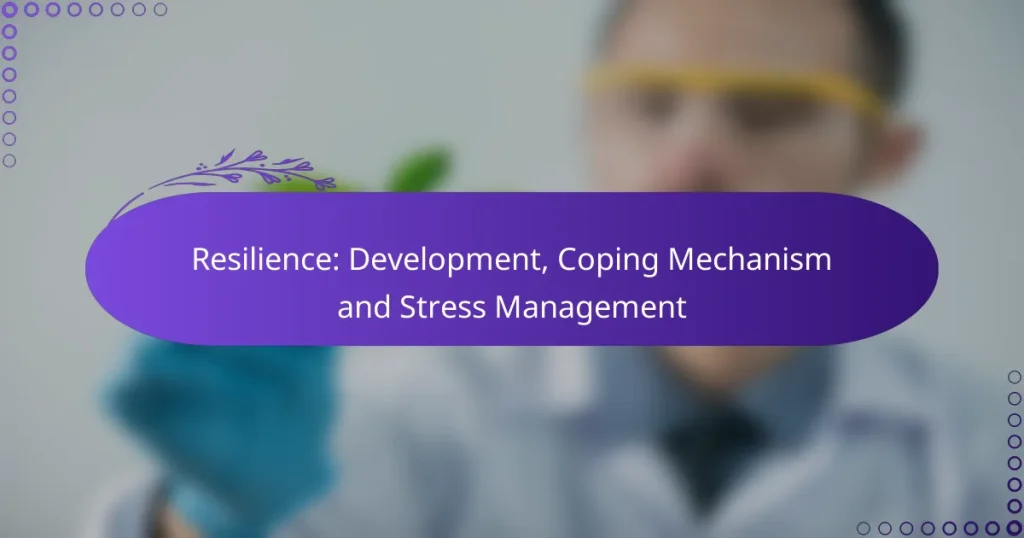Resilience is a vital quality that can be cultivated through various strategies, allowing individuals to better cope with stress and adversity. By employing techniques such as mindfulness, social connection, and positive thinking, one can enhance their ability to manage life’s challenges effectively. This proactive approach not only improves emotional well-being but also transforms difficulties into opportunities for personal growth.
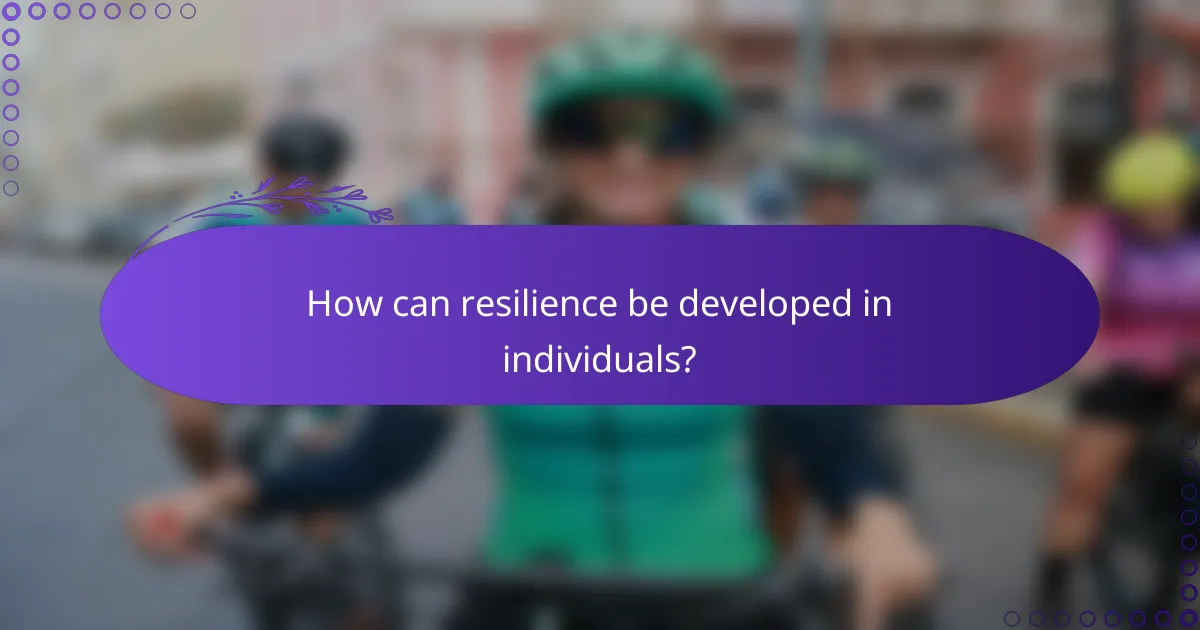
How can resilience be developed in individuals?
Resilience can be developed through various strategies that enhance an individual’s ability to cope with stress and adversity. Key methods include mindfulness practices, building social connections, goal setting techniques, positive thinking strategies, and physical fitness routines.
Mindfulness practices
Mindfulness practices involve focusing on the present moment and accepting it without judgment. Techniques such as meditation, deep breathing, and yoga can help individuals manage stress and improve emotional regulation.
To incorporate mindfulness, set aside a few minutes daily for meditation or breathing exercises. Apps like Headspace or Calm can guide beginners through the process.
Building social connections
Strong social connections are crucial for resilience as they provide emotional support during tough times. Engaging with friends, family, or community groups can foster a sense of belonging and security.
Consider joining local clubs or volunteering to meet new people. Regularly reaching out to friends or family for support can also strengthen these connections.
Goal setting techniques
Setting realistic and achievable goals can enhance resilience by providing direction and motivation. Break larger goals into smaller, manageable tasks to create a sense of accomplishment.
Use the SMART criteria—Specific, Measurable, Achievable, Relevant, Time-bound—to structure your goals effectively. Regularly review and adjust your goals as needed to stay on track.
Positive thinking strategies
Positive thinking strategies involve reframing negative thoughts and focusing on strengths and solutions. Practicing gratitude and self-compassion can significantly improve mental resilience.
Keep a gratitude journal to regularly note things you appreciate. Challenge negative thoughts by asking yourself if they are based on facts or assumptions.
Physical fitness routines
Regular physical activity is essential for building resilience as it reduces stress and enhances mood. Aim for at least 150 minutes of moderate exercise per week, such as brisk walking, cycling, or swimming.
Incorporate activities you enjoy to maintain consistency. Group classes or team sports can also provide social benefits while improving fitness.
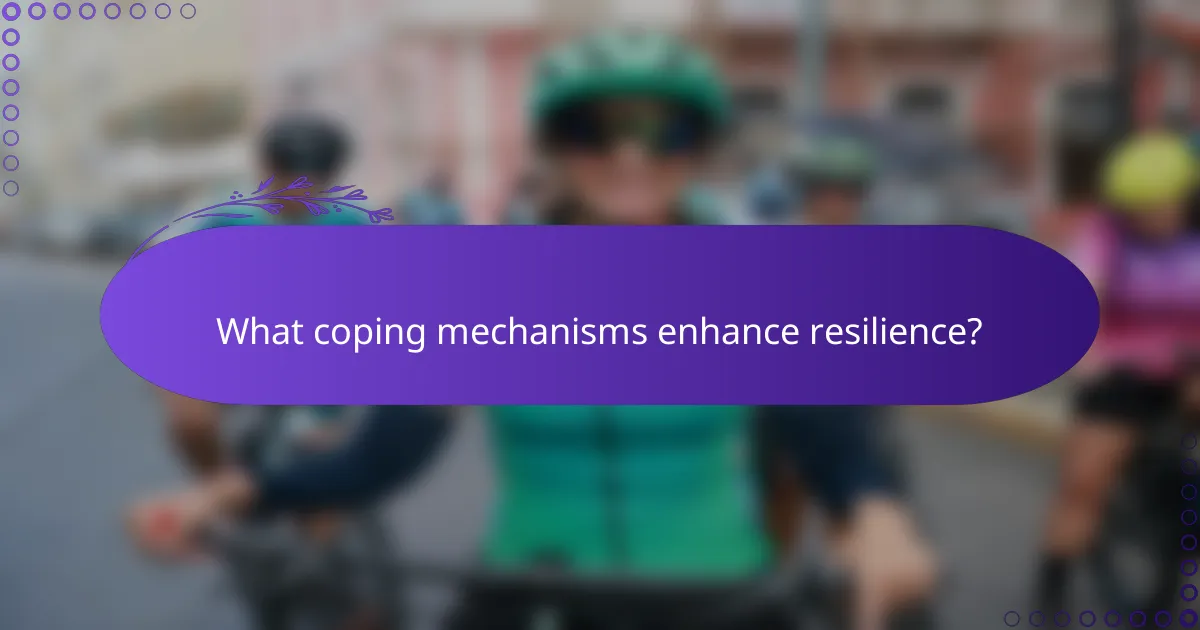
What coping mechanisms enhance resilience?
Coping mechanisms that enhance resilience include strategies that help individuals effectively manage stress and adapt to challenges. These mechanisms can improve emotional well-being and foster a proactive approach to life’s difficulties.
Problem-solving skills
Problem-solving skills are essential for enhancing resilience as they enable individuals to identify issues and develop practical solutions. This involves breaking down challenges into manageable parts and systematically addressing each component.
To improve problem-solving abilities, practice techniques such as brainstorming potential solutions, evaluating the pros and cons of each option, and seeking feedback from others. Regularly engaging in these practices can build confidence and competence in tackling future problems.
Emotional regulation techniques
Emotional regulation techniques help individuals manage their emotional responses to stressors, which is crucial for maintaining resilience. Techniques such as mindfulness, deep breathing, and cognitive reframing can assist in controlling negative emotions and promoting a balanced mindset.
For example, mindfulness meditation can reduce anxiety and improve focus, while cognitive reframing encourages viewing challenges from a different perspective. Incorporating these practices into daily routines can enhance emotional stability over time.
Stress-reduction methods
Stress-reduction methods are vital for building resilience, as they help mitigate the impact of stress on mental health. Common techniques include physical exercise, relaxation exercises, and engaging in hobbies that promote joy and relaxation.
Regular physical activity, such as walking or yoga, can significantly lower stress levels. Additionally, setting aside time for enjoyable activities can provide a necessary break from daily pressures. Aim for at least 30 minutes of moderate exercise several times a week to effectively manage stress.
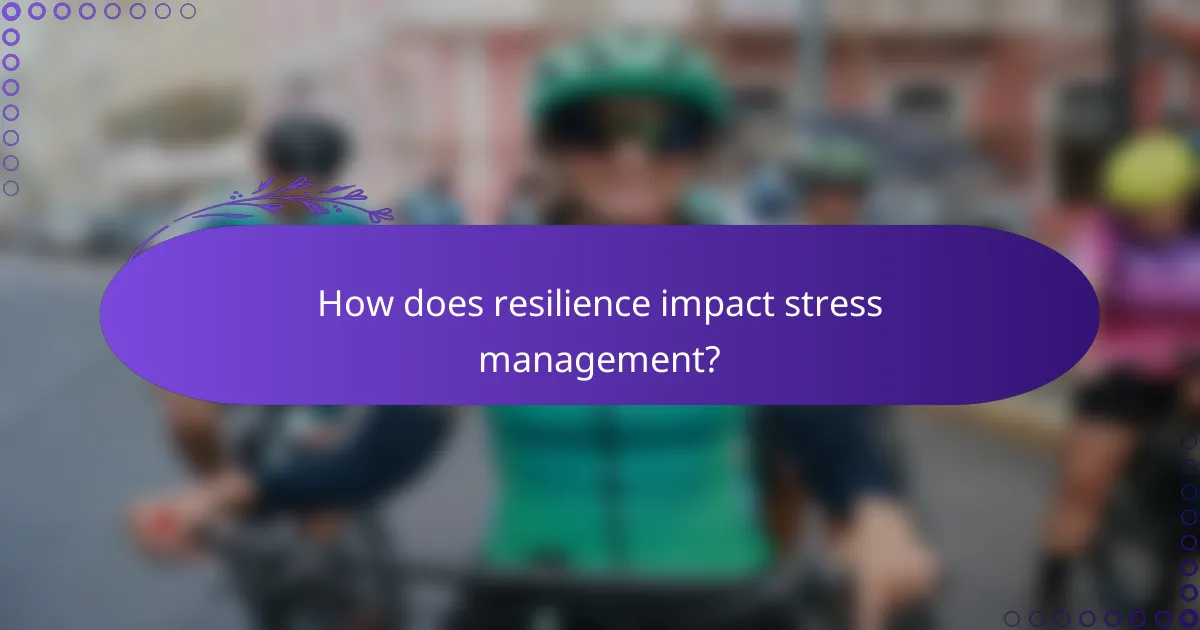
How does resilience impact stress management?
Resilience significantly enhances stress management by enabling individuals to effectively cope with challenges and bounce back from adversity. It fosters a mindset that views difficulties as opportunities for growth, ultimately leading to improved overall well-being.
Improved emotional health
Resilience contributes to better emotional health by promoting positive thinking and emotional regulation. Individuals with high resilience are less likely to experience anxiety and depression, as they can process their emotions constructively and maintain a balanced perspective during stressful times.
Practicing resilience can include techniques such as mindfulness and gratitude, which help individuals focus on positive aspects of their lives. Regularly engaging in these practices can lead to a more optimistic outlook and reduced emotional distress.
Better coping strategies
Resilient individuals develop effective coping strategies that allow them to manage stress more efficiently. This includes problem-solving skills, seeking social support, and employing relaxation techniques, which can mitigate the impact of stressors.
For example, someone facing workplace stress might use time management skills to prioritize tasks or reach out to colleagues for assistance. These strategies not only alleviate immediate stress but also build confidence in handling future challenges.
Enhanced adaptability
Resilience fosters enhanced adaptability, enabling individuals to adjust to new circumstances and recover from setbacks more quickly. This adaptability is crucial in today’s fast-paced environment, where change is constant and often unpredictable.
Being adaptable means being open to change and willing to learn from experiences. For instance, a resilient person might embrace new technologies at work rather than resist them, viewing such changes as opportunities to grow and improve their skill set.
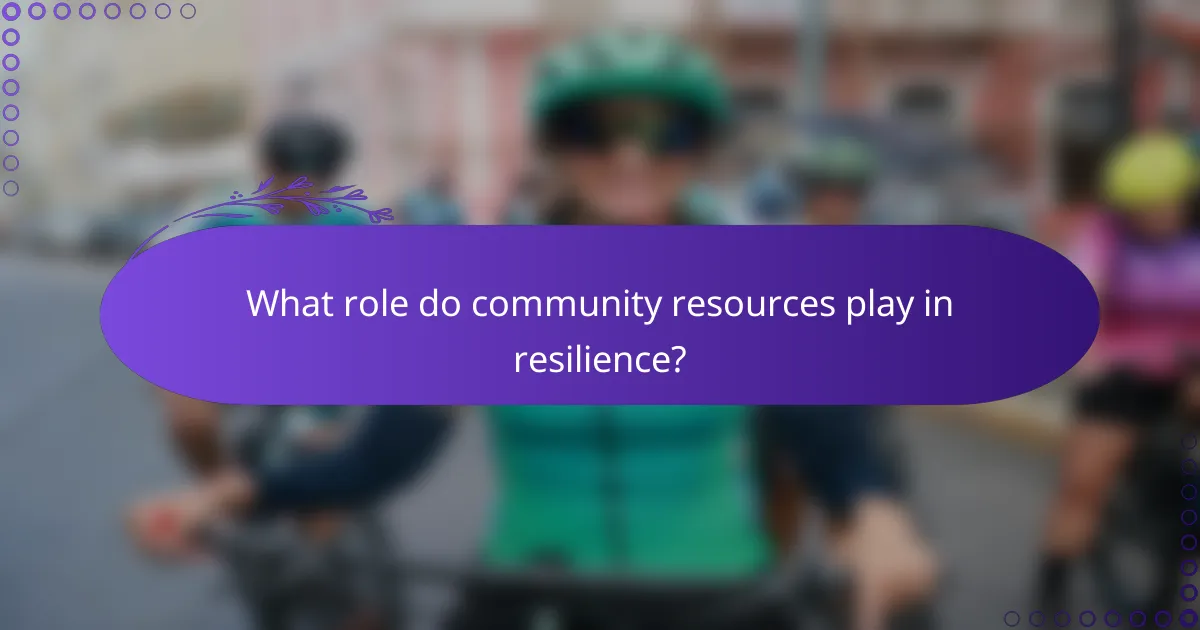
What role do community resources play in resilience?
Community resources significantly enhance resilience by providing essential support systems that individuals can rely on during challenging times. These resources include access to mental health services and support groups, which help individuals develop coping mechanisms and manage stress effectively.
Access to mental health services
Access to mental health services is crucial for building resilience, as it allows individuals to seek professional help when facing emotional or psychological challenges. Services may include therapy, counseling, and medication management, which can be tailored to meet individual needs.
In many regions, community health centers offer sliding scale fees based on income, making mental health care more affordable. It’s important to research local options, as some areas may have specific programs funded by government initiatives or non-profit organizations.
Support groups availability
Support groups provide a platform for individuals to share experiences and coping strategies, fostering a sense of community and belonging. These groups can focus on various issues, such as grief, addiction, or chronic illness, and often meet regularly to maintain connections.
Finding a support group can be as simple as checking local community centers, hospitals, or online platforms. Many groups are free or have minimal costs, making them accessible to a wide range of individuals. Engaging in these groups can significantly enhance emotional resilience by reducing feelings of isolation and promoting shared understanding.
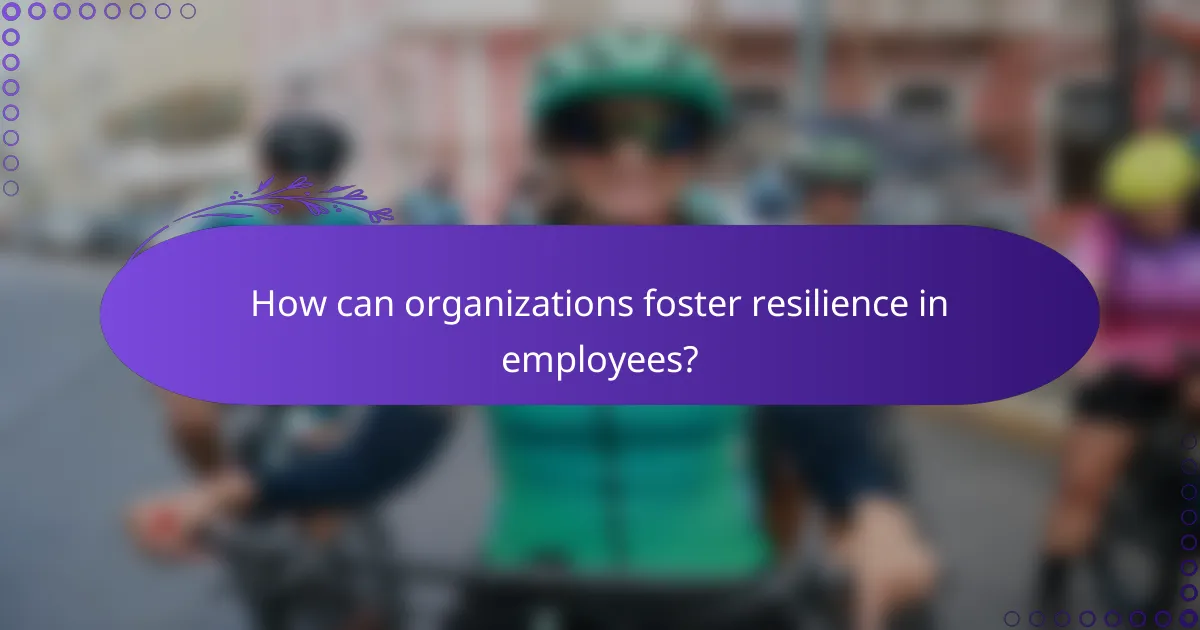
How can organizations foster resilience in employees?
Organizations can foster resilience in employees by implementing supportive practices that enhance well-being and adaptability. This involves creating an environment where employees feel valued, supported, and equipped to handle stress effectively.
Workplace wellness programs
Workplace wellness programs are initiatives designed to promote physical and mental health among employees. These programs can include fitness classes, mental health resources, and stress management workshops. By investing in wellness, organizations can reduce absenteeism and improve overall employee morale.
To be effective, wellness programs should be tailored to the specific needs of the workforce. Regular surveys can help identify employee interests and areas for improvement. Additionally, offering incentives for participation can increase engagement and commitment to these programs.
Flexible work arrangements
Flexible work arrangements allow employees to adjust their work schedules or locations, which can significantly enhance resilience. Options such as remote work, flexible hours, or compressed workweeks provide employees with the autonomy to balance personal and professional responsibilities, reducing stress levels.
Organizations should consider implementing policies that support flexibility, such as clear guidelines for remote work and communication protocols. Encouraging a culture of trust and accountability can further empower employees to manage their time effectively, leading to improved job satisfaction and productivity.
